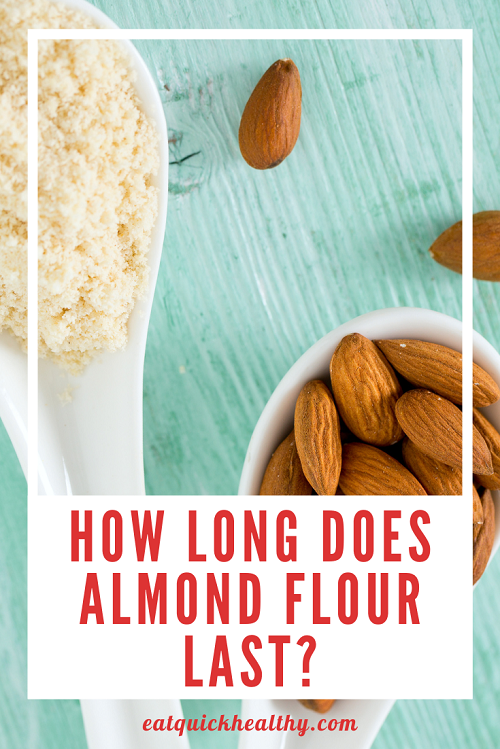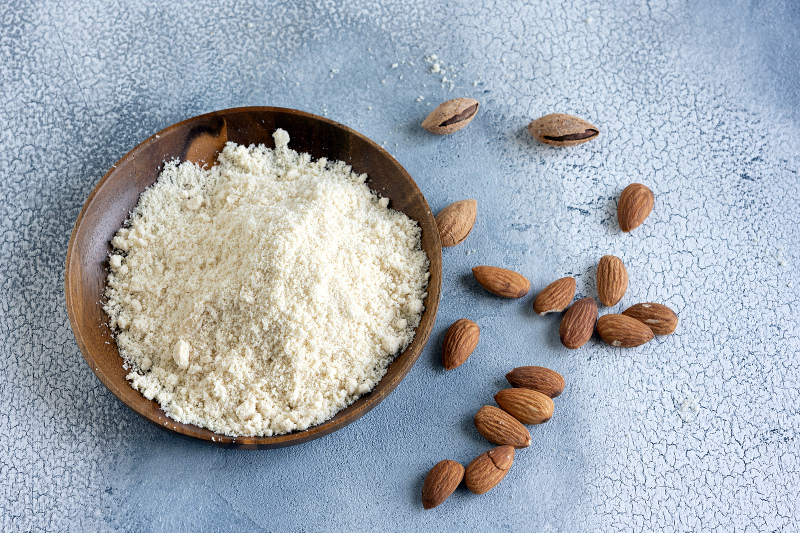Got some almond flour sitting around and wondering if it’s still ok to use? Can it go bad? How should you store almond flour to make it last and what is the almond flour shelf life anyway?!
I’ve got all the answers to these questions and more below.
Almond flour is a nutritious, gluten-free flour option which can be a great addition in your cooking. However, it’s not quite the same as normal flour which may have you wondering some of the questions above.
So I took what I knew from experience and hit the internet to do some further research so I could give you all the top answers to all your almond flour related questions.
This includes whether almond flour goes bad, how you can tell if your almond flour is bad, the full answer to how long does almond flour last and how you can store your almond flour so it stays good for as long as possible.
Let’s start!

What Is Almond Flour?

Almond flour is a useful flour for those who want to go gluten free, are following a paleo diet or are looking for a flour with more protein or nutrients.
It is made by grounding almonds that have had the skins removed. The skins can be removed by soaking almonds in boiling water and then drying them before grounding them to the texture you want.
Almond flour is made solely from almonds so naturally has an almond taste. It can taste like roasted almonds in baking and it has a very pale brown/off-white color.
Almond flour is high in protein and heart-healthy fats which can lead to an added moist texture when cooking items like muffins and brownies.
It can be a useful alternative to regular flour (read more about substituting them here), but it does lead to a denser end product.
Almond Flour Vs Almond Meal
Almond meal is very similar but different to almond flour and they can’t be used interchangeably unless you don’t mind different results in your cooking.
The difference is that while almond flour is ground from almonds with the skins removed, almond meal is ground from almonds WITHOUT their skins removed.
This gives a darker, coarser flour with a stronger taste that can be bitter.
This difference in color, texture and taste leads to different results.
Does Almond Flour Go Bad?
Yes, almond flour can go bad. Almond flour is made solely from almonds which means it is full of healthy fats. Fats can go rancid which means that almond flour can spoil. This happens with exposure to light, heat and moisture and it will happen over time.
It does last for quite awhile and you don’t have to worry about using all your almond flour within a month of buying it. It can also last longer depending on how you store it. Below, I go through all the answers to how long does almond flour last in pantry, fridge and other options.
How Can You Tell If Almond Flour Is Bad?

So you’ve had some almond flour sitting round for awhile and you’re not sure if it’s ok. What should you do?
Don’t worry. It’s quite simple to tell if your almond flour is good or bad. Follow the steps below to work it out.
Step 1: Examine The Almond Flour
The first step is to take a good look at your almond flour as well as the packaging/container where you are storing it.
Is there any damage to the packaging/container? Is it airtight?
If there is any damage to the packaging, you’ll want to be extra careful when examining the almond flour itself especially if the packaging has any water damage or the flour has been exposed to the air.
Next, look at the flour. Has the color changed? It should be an off-white or very pale brown color. If it’s changed color then throw it out.
Is any of the flour clumping together? This is also not a good sign and shows the flour has been exposed to moisture or water. This is when mold can start growing.
If there isn’t any mold and you noticed the clumps quickly, you can sift and dry out the flour and it can still be ok.
Finally, check for any mold or any signs of worms or insects. If there are any of these things, toss the flour.
Step 2: Sniff The Almond Flour
Once the flour has passed the visual examination, sniff it.
You are expecting to smell a nutty, almond smell. If not, there could be a problem and you should toss it out.
Smells to look for are sour, wood or anything that smells off. Just throw it out if you are at all concerned.
How Long Does Almond Flour Last?
So how long does homemade almond flour last? Bought almond flour? Does it change depending on how you store it?
Best Before Dates
The first step is to look at the best before date that should be on your almond flour.
Remember that a best before date is the date at which the manufacturer of the almond flour believes the almond flour is at its best. It doesn’t mean that the next day, the almond flour is bad.
Keep The Bag Unopened
Almond flour can last quite awhile after the best before date, especially if it is unopened.
No matter how you store your almond flour, it is likely to last the longest when the bag is not opened, so keep your bag shut until you need to use some almond flour.
How Long Almond Flour Lasts In The Pantry, Fridge And Freezer
In the pantry, almond flour that is unopened can last 2-4 months longer than the best before date.
If you place your almond flour in the refrigerator, this can extend to up to 12 months past the best before date.
In the freezer, it can last up to two years longer. There is more information below about how to freeze almond flour.
| Almond Flour Is Stored In The… | The Almond Flour Lasts… |
| Pantry (Unopened bag) | Best before date + 2-4 months |
| Pantry (Opened bag) | Best before date |
| Refrigerator (Unopened bag) | Best before date + 6-12 months |
| Refrigerator (Opened bag) | Best before date + 3-6 months |
| Freezer | Best before date + 12-24 months |
Homemade almond flour may not get the same results thanks to being additive and preservative free. I aim to use all homemade almond flour within three months in the pantry or 6 months in the refrigerator.
How To Store Almond Flour
As you can see from the above, how you store your almond flour directly impacts how long it will last.
Almond flour goes rancid (i.e. bad) with exposure to light, moisture and heat. This means that when you are storing your almond flour, you want to avoid it being exposed to these things.
For this reason, the best way to store your almond flour is in an airtight container. A dark pantry is fine for unopened almond flour, but once you open it, it can be worth considering storing it in the refrigerator.
This is because insects can be extra attracted to the oils in the almond flour but also because it will last longer in the fridge. If you leave somewhere hot or with humidity, you should extra consider this.
It’s important to store your almond flour in an airtight container in the refrigerator to stop any moisture getting in.
Finally, if you want your almond flour to last even longer, you can consider storing it in the freezer. You can store it in freezer bags or airtight containers. Double wrapping it in freezer bags can help protect it and minimize any changes to it.
When you want to use the almond flour, make sure you let it fully defrost before using it.
Read our full guide to storing almond flour here.
Conclusion
I hope you found this guide to how long does almond flour keep useful! Almond flour is a great ingredient and it can last a long time especially if you store it correctly.
While it can go bad, this can be minimized by keeping it unopened for as long as possible and then storing it in an airtight container. Doing this can help it last long past the expiry date especially if you store it in the refrigerator or freezer.
You can find our guide to the differences between almond flour and regular flour here, almond flour and rice flour here or find all our guides to everything almond related here.



Comments are closed.